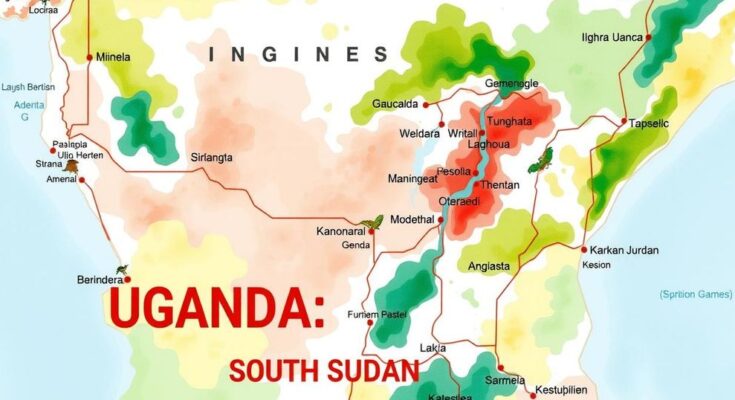The article highlights Uganda’s controversial military involvement in South Sudan under President Yoweri Museveni, which is perceived as supporting oppressive governance by President Salva Kiir. It discusses the detrimental effects of relying on foreign military forces, presents historical ties that have soured, and calls for self-reliance and genuine peace efforts while urging the international community to act against further interference.
Uganda’s involvement in South Sudan has raised significant concerns regarding governance and transparency, leading to a deterioration of trust and potential escalation of conflict. This marks Uganda’s second major military involvement in South Sudan within the past decade, with President Yoweri Museveni’s actions perceived as supporting President Salva Kiir’s oppressive regime, undermining peace and stability in the region.
Dependence on Ugandan military support for managing internal disputes in South Sudan hampers the perception of the national army’s capability, exposing the nation to external exploitation. Such reliance conveys weakness, allowing neighboring countries to exploit the situation, further threatening South Sudan’s territorial integrity and sovereignty.
Historically, South Sudan appreciates Uganda’s past solidarity during liberation struggles, where countless families sought refuge across borders. However, Uganda’s military presence since 2013, purportedly supporting one faction in the internal conflict, has led to allegations of war crimes and human rights violations, straining the once-cherished relationship.
Many South Sudanese view Uganda as an ally to a government they deem illegitimate and oppressive. Uganda’s military involvement often aligns with the interests of President Kiir to defeat his political rival, Riek Machar, leading to perceptions of Uganda as a sectarian actor. Such actions exacerbate internal tensions and invite further regional interference, detracting from avenues of peace.
The reputation of the Uganda People’s Defence Force (UPDF) is at risk, having shifted from a respected peacekeeping force to one perceived as mercenaries for hire. This transformation threatens international support for UPDF, compromising its role in regional stability.
The international community, including bodies like the United Nations and African Union, must view Uganda’s role in South Sudan as detrimental. Pressure should be applied for Uganda to withdraw its forces and refocus on constructive peace efforts. The South Sudanese populace is urged to resist external meddling that undermines their sovereignty and resilience.
The South Sudanese government should prioritize funding its military forces instead of channeling funds towards foreign military involvement. True liberation should arise from within, ensuring that self-determination and national integrity is maintained.
Despite historical ties, Ugandans are encouraged to uphold neighborly values and reject any aggressive policies. It would indeed be tragic for President Museveni’s legacy if the South Sudan he aided in its liberation becomes one he helped undermine, transforming a once-reputable army into one for hire amidst regional strife.
Dr. Remember Miamingi, a South Sudanese expert in governance and human rights, profoundly articulates these sentiments in his commentary, emphasizing the need for genuine peace and self-reliance in South Sudan’s governance.
In conclusion, Uganda’s military involvement in South Sudan has dramatically impacted regional dynamics, presenting governance challenges and complicating internal conflicts. As the international community urges for Uganda’s withdrawal, it is imperative for South Sudan to focus on building its military capacity and seeking authentic self-governance. Strengthening national integrity and sovereignty is crucial for true liberation and lasting peace in the region.
Original Source: www.independent.co.ug




